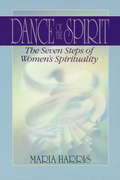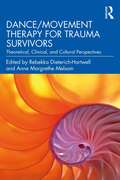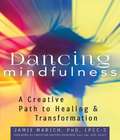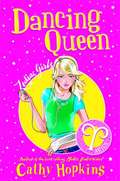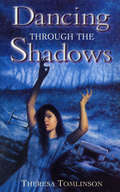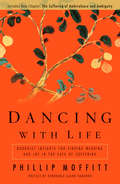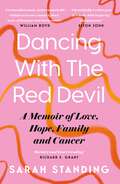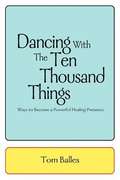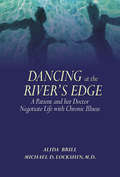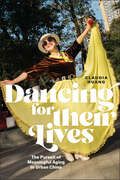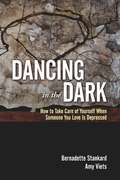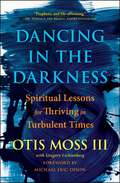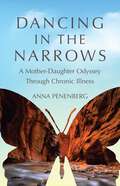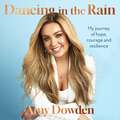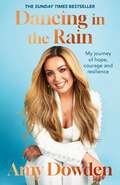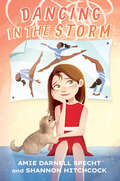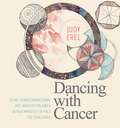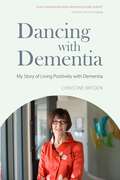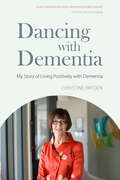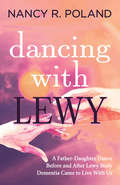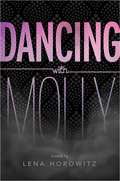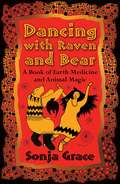- Table View
- List View
Dance of the Spirit: The Seven Stages of Women's Spirituality
by Maria HarrisEach woman has a special spiritual destiny, as unique and inalienable as the rhythms that govern her life. Maria Harris teaches women how to dance to the music of their own souls and discover the spiritual steps that can transform their lives.
Dance/Movement Therapy for Trauma Survivors: Theoretical, Clinical, and Cultural Perspectives
by Rebekka Dieterich-HartwellThis book offers a timely, detailed, and comprehensive synopsis of dance/movement therapy (DMT) in the treatment of psychological trauma. Along with the foundational concepts of DMT, tied to traditional trauma theory and a neurobiological framework, contributions contain rich clinical examples that illustrate the use of dance, creative movement, and body awareness with a wide variety of populations including survivors of sex trafficking, military veterans, refugees, those with multigenerational trauma, and others. Chapters emphasize the underlying influences of power, privilege, and oppression on trauma, prompting practitioners to consider and understand the dynamics of sociocultural contexts and engage in continuous self-reflection. Featuring multiple perspectives, as well as cultural and contextual considerations, this book provides direct takeaways for clinicians and professionals and concludes with a roadmap for the trajectory of trauma-informed, healing-centered DMT.
Dancing Mindfulness: A Creative Path to Healing and Transformation
by Jamie MarichUsing theory and step-by-step exercises, dancer and clinical counselor Dr. Jamie Marich expertly guides you through seven primary elements of mindfulness in motion: breath, sound, body, story, mind, spirit and fusion. By dancing through these seven elements, either in personal practice or in a group, you will be better able to: <p><p> - Access your body’s own healing resources through informal dance <p> - Realize the transformative power of your personal creativity <p> - Strengthen your abilities to exercise non-judgment, patience, a sense of play, trust, acceptance and letting go <p> - Practice mindfulness even if you have struggled with traditional sitting meditation <p> - Share healing dances with others to build on your own strengths, resources and experiences
Dancing Queen
by Cathy HopkinsMarsha is an outgoing and popular Aries== a drama queen who lands a part in the school play. But just before the curtain goes up, she injures herself, crushing all her hopes for stardom.
Dancing Skeletons: Life and Death in West Africa
by Katherine A. DettwylerAn anthropological study of children's malnutrition in Mali.
Dancing Through The Shadows
by Theresa Tomlinson'They tell you that most lumps are nothing. ' Mum's voice wobbled. 'But mine is cancerous . . . . oh dear. Its a bit of a shock, it really is!' And so Ellen and her family must learn with the reality of her mum's breast cancer. Ellen finds solace in her dancing and coupled with an unexpected discovery in the school grounds, she is able to face the difficult times ahead . . .
Dancing With Life: Buddhist Insights for Finding Meaning and Joy in the Face of Suffering
by Phillip MoffittWhy do we suffer? Is there a purpose to our pain? Noting that human beings have wrestled with such questions for thousands of years, Phillip Moffitt has found answers for his own life in Buddhist philosophy and meditation. Reflecting on his own journey from Esquire magazine editor-in-chief to Buddhist meditation teacher, Moffitt provides a fresh perspective on the Buddha's ancient wisdom, showing how to move from suffering to new awareness and unanticipated joy.In this deeply spiritual book that is sure to become a Buddhist classic, Moffitt explores the twelve insights that underlie the Buddha's core teaching--the Four Noble Truths--and uses these often neglected ideas to guide readers to a more meaningful relationship to suffering. Moffitt write: "These twelve insights teach you to dance with both the joy and pain, finding peace in a balanced mind and calm spirit. As the most specific, practical life instructions I have ever encountered, they serve as an invaluable tool for anyone who seeks a life filled with meaning and well-being." Practicing these twelve insights, as Moffitt suggests, will help readers experience life's difficulties without being filled with stress and anguish, and they will enhance their moments of happiness.With engaging writing and a strong message of self-empowerment, Dancing with Life offers a prescriptive path for finding joy and peace that will appeal to meditation students and readers of "Dharma Wisdom," Moffitt's column in Yoga Journal, as well as anyone searching for a more authentic life.
Dancing With The Red Devil: A Memoir of Love, Hope, Family and Cancer
by Sarah Standing'A beautifully written gem of a book, both inspiring and poignant.' Elton John'Incisive and heart-rending.' Richard E GrantSarah Standing is a wife, a mother, a journalist, a toy shop owner, a grandmother, a great friend, a daughter, and a lover of life. She does not have the time, or inclination, to deal with cancer. But shit happens. After a week or two of struggling to catch her breath, Sarah pops along to see her GP for a few tests. By the end of the day, she has a bag of what looks like bone broth draining from her body and is dealing with a diagnosis of non-Hodgkins lymphoma. It's cancer, says her doctor, but it's the good kind.Radiating personality from the very first page, this memoir is filled with joy, hope and love, and screams 'FUCK YOU, CANCER' at the top of its lungs. Covering the six months that Sarah undergoes chemo - separated from her family by the laws of lockdown - this book will make you laugh, sob and grab life firmly by the balls so you can live the hell out of it.
Dancing With The Red Devil: A Memoir of Love, Hope, Family and Cancer
by Sarah Standing'A beautifully written gem of a book, both inspiring and poignant.' Elton John'Incisive and heart-rending.' Richard E GrantSarah Standing is a wife, a mother, a journalist, a toy shop owner, a grandmother, a great friend, a daughter, and a lover of life. She does not have the time, or inclination, to deal with cancer. But shit happens. After a week or two of struggling to catch her breath, Sarah pops along to see her GP for a few tests. By the end of the day, she has a bag of what looks like bone broth draining from her body and is dealing with a diagnosis of non-Hodgkins lymphoma. It's cancer, says her doctor, but it's the good kind.Radiating personality from the very first page, this memoir is filled with joy, hope and love, and screams 'FUCK YOU, CANCER' at the top of its lungs. Covering the six months that Sarah undergoes chemo - separated from her family by the laws of lockdown - this book will make you laugh, sob and grab life firmly by the balls so you can live the hell out of it.
Dancing With The Ten Thousand Things: Ways to Become a Powerful Healing Presence
by Tom BallesThis book outlines the journey of waking up through being of service. You will observe two changes taking place: less unnecessary suffering and greater possibilities in the life you share with others. You will learn to consciously tend to life one moment at a time. Tom Balles has gathered his years of study in a variety of traditions and offers them as a gift.
Dancing at the River’s Edge: A Patient and her Doctor Negotiate Life with Chronic Illness
by Michael D. Lockshin Alida BrillAn invaluable resource for medical professionals, victims of chronic illnesses, and their loved ones, this dual memoir by a doctor and his longtime patient traces the growth of their unique friendship over a span of decades. By exploring the bond between caregiver and sufferer, this sensitive account evokes not only the constant day to day frustrations and emotional toll suffered by the chronically ill, but also an understanding of the mental struggles and conflicts that a conscientious doctor must face in deciding how best to treat a patient without compromising personal freedoms. In alternating chapters, the narrative explores the frustration, joy, despair, grief, and pain on both sides of the doctor-patient relationship.
Dancing for Their Lives: The Pursuit of Meaningful Aging in Urban China (Global Perspectives on Aging)
by Claudia HuangDancing for Their Lives explores the vibrant world of retired Chinese women known as "dancing grannies” who seek fulfillment and companionship amidst societal upheaval. These women, part of China’s “lost generation,” gather in parks and public squares to reclaim their lives through dance in the wake of Chinese economic and cultural transformations. The book challenges prevailing narratives of aging societies, portraying old age as a site of social innovation rather than decline. Based on ethnographic research conducted in Chengdu, China, Dancing for Their Lives reveals how retirees learn to navigate shifting social norms and values while actively creating new models for growing older. The book’s insights resonate beyond Chinese society, offering lessons on resilience and the pursuit of meaning in any aging population. Dancing for Their Lives underscores the human capacity to craft purposeful lives amid uncertainty, transcending geographical boundaries to illuminate the universal quest for fulfillment in later years.
Dancing in the Dark
by Amy Viets Bernadette StankardDancing in the Dark is brimming with tried-and-true suggestions, helpful hints, and up-to-date resources for anyone whose life is affected by the depression of another. Authors Bernadette Stankard and Amy Viets offer compassionate wisdom, reflective quotations, and practical assistance based on their personal experience of life with depressed partners.
Dancing in the Darkness: Spiritual Lessons for Thriving in Turbulent Times
by Rev. Otis Moss, IIIA guide to uplift our spirits as we work for justice in these politically turbulent times—from Reverend Otis Moss, III, Senior Pastor at Chicago&’s Trinity United Church of Christ and one of the country&’s most renowned and beloved spiritual and civil rights leaders. Once again, as Dr. Martin Luther King, Jr. first observed in the 1960s, it is midnight in America—a dark time of division and anxiety, with threats of violence looming in the shadows. In 2008, the Trinity United Church in Chicago received threats when one of its parishioners, Senator Barack Obama, ran for president. &“We&’re going to kill you&” rang in Reverend Otis Moss&’s ears when he suddenly heard a noise in the middle of the night. He grabbed a baseball bat to confront the intruder in his home. When he opened the door to his daughter&’s room, he found that the source of the noise was his own little girl, dancing. She was simply practicing for her ballet recital. In that moment, Pastor Moss saw that the real intruder was within him. Caught in a cycle of worry and anger, he had allowed the darkness inside. But seeing his daughter evoked Psalm 30: &“You have turned my mourning into dancing.&” He set out to write the sermon that became this inspiring and transformative book. Dancing in the Darkness is a life-affirming guide to the practical, political, and spiritual challenges of our day. Drawing on the teachings of Dr. King, Howard Thurman, sacred scripture, southern wisdom, global spiritual traditions, Black culture, and his own personal experiences, Dr. Moss instructs you on how to practice spiritual resistance by combining justice and love. This collection helps us tap the spiritual reserves we all possess but too often overlook, so we can slay our personal demon, confront our civic challenges, and reach our highest goals.
Dancing in the Narrows: A Mother-Daughter Odyssey Through Chronic Illness
by Anna PenenbergDancing in the Narrows chronicles a mother and daughter&’s multiyear journey through illness and trauma. At sixteen, Anna&’s youngest daughter, Dana, is stricken with a mysterious and debilitating condition, eventually diagnosed as Lyme disease. Desperate to find a cure, the two women are thrust into the established medical world, then far beyond. Full of adventure, humor, and blind faith, Dancing in the Narrows is an inspiring story of self-discovery as a single mother fights to save the life of her child.
Dancing in the Rain: My story of hope, courage and resilience
by Amy DowdenStrictly Come Dancing professional and breast cancer and Crohn's awareness advocate Amy Dowden shares her journey from growing up in the Welsh Valleys to dancing on the glittering stage of prime-time television. Through her debilitating illness as a teen and her recent chemotherapy treatment for stage 3 breast cancer, Amy's is a story of an unbreakable spirit with an irrepressible joy for life and dance; she is living proof that our darkest times do not define us. From her first dance lesson, Amy never wanted to be off the dance floor; when the music is on, nothing else matters, and it has been what has kept her going in the toughest of times. Despite facing the relentless challenges of undiagnosed Crohn's disease through her teens, Amy's love for dance remained unwavering. Her passion led her to win the British Championships with her partner and become the first Welsh professional dancer on Strictly Come Dancing. However, Amy's journey took an unexpected turn when she discovered a lump in her breast just before her honeymoon. Despite undergoing a mastectomy and enduring gruelling chemotherapy, her journey was far from over. Complications arose, and she faced the harsh reality of reduced chances of having children. Yet, through it all, Amy's spirit remained unbroken, fuelled by her love for dance and the unwavering support of her family, friends and supporters.In Dancing in the Rain, Amy Dowden shares her poignant and deeply personal story, offering solace and inspiration to anyone navigating life's storms. With courage and vulnerability, she reminds us that no matter the challenge, the human spirit can prevail, and that even in the darkest of times, there is always hope.
Dancing in the Rain: My story of hope, courage and resilience
by Amy DowdenStrictly Come Dancing professional and breast cancer and Crohn's awareness advocate Amy Dowden shares her journey from growing up in the Welsh Valleys to dancing on the glittering stage of prime-time television. Through her debilitating illness as a teen and her recent chemotherapy treatment for stage 3 breast cancer, Amy's is a story of an unbreakable spirit with an irrepressible joy for life and dance; she is living proof that our darkest times do not define us. From her first dance lesson, Amy never wanted to be off the dance floor; when the music is on, nothing else matters, and it has been what has kept her going in the toughest of times. Despite facing the relentless challenges of undiagnosed Crohn's disease through her teens, Amy's love for dance remained unwavering. Her passion led her to win the British Championships with her partner and become the first Welsh professional dancer on Strictly Come Dancing. However, Amy's journey took an unexpected turn when she discovered a lump in her breast just before her honeymoon. Despite undergoing a mastectomy and enduring gruelling chemotherapy, her journey was far from over. Complications arose, and she faced the harsh reality of reduced chances of having children. Yet, through it all, Amy's spirit remained unbroken, fuelled by her love for dance and the unwavering support of her family, friends and supporters.In Dancing in the Rain, Amy Dowden shares her poignant and deeply personal story, offering solace and inspiration to anyone navigating life's storms. With courage and vulnerability, she reminds us that no matter the challenge, the human spirit can prevail, and that even in the darkest of times, there is always hope.
Dancing in the Rain: My story of hope, courage and resilience
by Amy DowdenStrictly Come Dancing professional and breast cancer and Crohn's awareness advocate Amy Dowden shares her journey from growing up in the Welsh Valleys to dancing on the glittering stage of prime-time television. Through her debilitating illness as a teen and her recent chemotherapy treatment for stage 3 breast cancer, Amy's is a story of an unbreakable spirit with an irrepressible joy for life and dance; she is living proof that our darkest times do not define us. From her first dance lesson, Amy never wanted to be off the dance floor; when the music is on, nothing else matters, and it has been what has kept her going in the toughest of times. Despite facing the relentless challenges of undiagnosed Crohn's disease through her teens, Amy's love for dance remained unwavering. Her passion led her to win the British Championships with her partner and become the first Welsh professional dancer on Strictly Come Dancing. However, Amy's journey took an unexpected turn when she discovered a lump in her breast just before her honeymoon. Despite undergoing a mastectomy and enduring gruelling chemotherapy, her journey was far from over. Complications arose, and she faced the harsh reality of reduced chances of having children. Yet, through it all, Amy's spirit remained unbroken, fuelled by her love for dance and the unwavering support of her family, friends and supporters.In Dancing in the Rain, Amy Dowden shares her poignant and deeply personal story, offering solace and inspiration to anyone navigating life's storms. With courage and vulnerability, she reminds us that no matter the challenge, the human spirit can prevail, and that even in the darkest of times, there is always hope.
Dancing in the Storm
by Amie Darnell Specht Shannon HitchcockIn the tradition of Out of My Mind and Rules, and inspired by the co-author&’s own life, this is a heartfelt, candid, and illuminating story of a girl learning to live fully with a rare genetic disorder.Kate&’s life in Baton Rouge, full of friends and family, gymnastics and Girl Scouts, is just plain great. But then, at the age of twelve, she suddenly develops a mysterious shoulder pain that won&’t go away . . . and that will change her life forever. It turns out that Kate has one of the rarest genetic disorders in the world, Fibrodysplasia Ossificans Progressiva. FOP causes bone to form in places in the body where it shouldn&’t, and there&’s no cure yet. Kate will need to learn how to live with this difficult new reality, helped by those close to her and by a new pen pal named Amie, who has been living with FOP for years.Drawing upon much of Amie Specht&’s own experiences with FOP, she and esteemed novelist Shannon Hitchcock have created a poignant, eye-opening, and uplifting story of finding courage and joy in the face of adversity.
Dancing with Cancer: Using Transformational Art, Meditation and a Joyous Mindset to Face the Challenge
by Judy ErelCombining the personal and the practical, this book mixes the author’s own cancer story with the tools she discovered and adapted to support her treatment.The wisdom and knowledge that Judy has learned from her experience with cancer can be our guide and coach.' - Bernie Siegel MD, Author of Love, Medicine & Miracles and The Art of Healing.Dancing with Cancer focuses on the creation of a positive and proactive mindset with which to face the specific challenges and stages of cancer. It combines the author’s own experience of using what she calls Thought Work (including creative self-expression, healing energy work and meditation) with conventional cancer treatment in order to connect her intentions for healing to the everyday reality of a diagnosis of incurable bone-marrow cancer. The book offers guidance and inspiration not only to cancer sufferers as they undergo the various stages of treatment but also to those supporting them, enabling them to understand better the experience of the cancer patient as well as the possibilities of mind–body empowerment.Part I allows the reader to gain inspiration and reassurance from Judy’s personal cancer story, as well as put into practice her Thought Work suggestions, which include revelatory questionnaires and journaling, creative exercises (such as drawing healing mandalas) and guided meditations. Part II gives a more detailed description of the Thought Work tools, including instructions for setting healing intentions, for using mindful breathing and for cultivating an attitude of gratitude, as well as meditations for a range of cancer situations and step-by-step instructions for creating artworks. Throughout the book are examples of Judy’s own transformative artworks, which she offers along with the reminder that any creative self-expression can be healing – it is not the outcome but the physical process of doing that matters, enabling multi-level transformation.
Dancing with Dementia: My Story of Living Positively with Dementia
by Christine BrydenChristine Bryden was a top civil servant and single mother of three children when she was diagnosed with dementia at the age of 46. Since then she has gone on to challenge almost every stereotype of people with dementia by campaigning for self-advocacy, writing articles and speaking at national conferences. This book is a vivid account of the author's experiences of living with dementia, exploring the effects of memory problems, loss of independence, difficulties in communication and the exhaustion of coping with simple tasks. She describes how, with the support of her husband Paul, she continues to lead an active life nevertheless, and explains how professionals and carers can help. Christine Bryden makes an outspoken attempt to change prevailing attitudes and misconceptions about the disease. Arguing for greater empowerment and respect for people with dementia as individuals, she also reflects on the importance of spirituality in her life and how it has helped her better understand who she is and who she is becoming. Dancing with Dementia is a thoughtful exploration of how dementia challenges our ideas of personal identity and of the process of self-discovery it can bring about.
Dancing with Dementia: My Story of Living Positively with Dementia
by Christine BrydenThe truly inspirational account of living positively with dementia. Christine Bryden was a top civil servant and single mother of three children when she was diagnosed with dementia at the age of 46. Since then she has gone on to challenge almost every stereotype of people with dementia by campaigning for self-advocacy, writing articles and speaking at national conferences.This book is a vivid account of the author's experiences of living with dementia, exploring the effects of memory problems, loss of independence, difficulties in communication and the exhaustion of coping with simple tasks. She describes how, with the support of her husband Paul, she continues to lead an active life nevertheless, and explains how professionals and carers can help.Christine Bryden makes an outspoken attempt to change prevailing attitudes and misconceptions about the disease. Arguing for greater empowerment and respect for people with dementia as individuals, she also reflects on the importance of spirituality in her life and how it has helped her better understand who she is and who she is becoming.Dancing with Dementia is a thoughtful exploration of how dementia challenges our ideas of personal identity and of the process of self-discovery it can bring about.(p)2017 Hodder & Stoughton Limited
Dancing with Lewy: A Father-Daughter Dance, Before and After Lewy Body Dementia Came to Live With Us
by Nancy R. PolandA woman recounts dementia’s toll on her family and shares lessons she learned that can provide help and hope to caregivers tending to their own loved ones.Within Dancing with Lewy, readers meet Lee and Nancy. Lee was born into a large farming family just before the Great Depression. He was a World War II Veteran, self-made businessman, artist, poet, and a man who would give a stranger his last nickel. Lee’s third daughter, Nancy, is practical, organized, pragmatic, a writer, and equals her father in a passion for life. Nancy was determined to take the helm when Lee’s mind began “dancing” with Lewy body dementia even though he resolved to remain independent while his mind slipped away. Within Dancing with Lewy, readers also meet God as the one who carried the family through this storm and offered grace to the weariness of the family.This memoir is written through Nancy’s eyes while original poetry by Lee is woven throughout to provide readers a glimpse into his outlook to life. In Part I of Dancing with Lewy,Nancy revisits Lee’s young life, her own years growing up with her dad, and the toll dementia took on their family. She shares the pain of grief when her mom died of cancer and her dad became even more confused. In Part II, she shares the lessons she learned along the way and offers hope for caregivers tending to their loved one(s) who have a debilitating illness.Nancy offers practical advice for caregivers such as how to:Get legal documents in orderFind community resourcesChoose a nursing home and partner with the staffTreat their loved one with respect and dignity
Dancing with Molly
by Lena HorowitzAn edgy and intimate glimpse at what one girl will do just to be the life of the party.Before, I was never the life of the party. I was the reliable one. The one no one had to worry about. The one no one had to think about. I was the one that everyone could ignore.Until that night, when everything changed and I finally became someone. Someone special. Someone memorable. Someone Carson might actually care about...But the cost of being someone is more than anyone can imagine. For every moment, there's a price to pay. For every party. For every choice made. For every kiss.Living a life of pure ecstasy might be no different from not living at all.
Dancing with Raven and Bear: A Book of Earth Medicine and Animal Magic
by Sonja GraceOriginal tales inspired by Native American and Norwegian folklore that highlight the wisdom of the divine natural world • Shares unique stories about Earth Medicine and animal magic, inspired by the author’s unusual Native American (Hopi) and Norwegian upbringing • Interwoven with ancient teachings and everyday practical applications of Earth Medicine, such as grounding and dream interpretation • Each tale is beautifully illustrated with the author’s original art, which promotes spiritual understanding and the power of the Earth’s healing properties • Paper with French flaps Drawing on both her Native American (Hopi) heritage and her Norwegian upbringing, renowned mystic and intuitive healer Sonja Grace shares original wisdom tales, received through her heart and soul, to take you on a journey into the magic of Raven and Bear and the healing power of Earth Medicine. Featuring Sonja’s distinctive and beautiful artwork, each story is embedded with ancient teachings to inspire you to live closer to the Earth. The fables include powerful examples of animal magic and everyday, practical applications of Earth Medicine, such as simple energy exercises, dream interpretations, Earth Medicine prayers and meditations, and using medicinal plants to manage negative energies. As background to the stories, Sonja reveals parallels between Norse mythology and Native American traditions and explores the symbology of animals and the recurring central theme of the tension between light and darkness. In Norse myth, the great god Odin, for instance, is often accompanied by Ravens. These birds are considered manifestations of the Valkyries, the goddesses who brought brave soldiers to Valhalla, while in Native American traditions, the Raven is viewed as a trickster or messenger, a magical creature with the ability to shapeshift into a human or animal, yet also portrayed as a hero overcoming adversity. The Bear on the other hand can embody the healer who grounds our energy and removes illness or can represent the inner part of us that has faith. In one fable, Sonja brings Bear to life as a mythical creature singing songs to bring in the light, reflecting the powerful lesson that by using our voice and speaking the truth we can hold darkness at bay. Throughout all of the stories, Raven and Bear teach us to be responsible for our actions and develop spiritual accountability. By sharing these tales of Earth Medicine, Sonja offers not only a path of reconnection with the Earth but also medicine for the soul. She shows how the Earth works in unity within herself and provides a warehouse of knowledge for all who live upon her.
